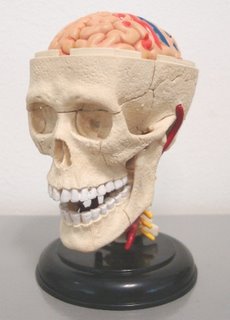 Was it a mistake?
Was it a mistake?The analysis continues...
4. Is the pharmaceutical growth a result of the biomedical push?
From the official report by A*Star, the biomedical manufacturing increased an impressive 30.2% over 2005 to S$23 billion dollars. Most of the output came from pharmaceutical industries (91%) and employment increased by 3.9% to reach 10 571.
However, Prof. Lee pointed out that the output from the biomedical sector cannot all be attributed to the billions being poured into the research drive, because there was already pharmaceutical manufacturing predating the push.
She then said that "Singapore's biomedical research initiative is not an important consideration except in the few cases where pharmaceutical companies have joint research ventures with A*Star."
I think that it is good that Prof. Lee is clarifying the difference between biomedical research and manufacturing. To see if her views are true, I went to the websites of prominent pharmaceutical companies in Singapore to find out when they came here. I also read through this long list of speeches given by key government officials regarding important events in the biomedical sector.
Here are the results:
Pfizer = 1964 (very small office then)
GlaxoSmithKline = 1970s
Schering-Plough = 1995
Eli Lilly = 1996
Novartis = 1997 (Ciba Geigy since 1971)
Merck Sharp & Dohme = 1998
Since the Life Sciences as an economic direction was announced by Mr. Philip Yeo only in Sep 2000, you can see that Prof. Lee's first observation is correct. Many international pharmaceutical companies were already alive and well before Singapore's biomedical initiative. The current industrial growth is not the direct result of research discoveries here in Singapore.
However, these pharma companies have not only grown in production output, they have also invested new infrastructure and even R&D departments into Singapore.
Here is a list of pharma investments in Singapore (focusing only on the abovementioned six companies) after Mr. Yeo's speech:
MSD (Sep 2001) - Multipurpose Chemical Bulk Actives Manufacturing Facility
Eli Lilly (Nov 2002) - Lilly System Biology Centre
Novartis (Jan 2003) - Novartis Institute For Tropical Diseases
MSD (Oct 2003) - Pharmaceutical Formulation Facility
Schering-Plough (Dec 2003) - Multi-Product Bulk Pharmaceutical Plant and R&D Facility
GSK (Jun 2004) - GSK Expanded Facility
Pfizer (Jul 2004) - Multi-Purpose Manufacturing Facility
Novartis (Mar 2005) - Novartis Singapore Pharma Manufacturing
GSK (Nov 2005) - R&D Pilot Plant
GSK (Jun 2006) - GSK Biological's Vaccine Manufacturing Facility
If the pharma companies were not planning to benefit from Singapore's biomedical initiative, why would they spend good money to set up R&D departments here? I think that our current biomedical policy plays a crucial role in enhancing the pharma companies' confidence to invest in Singapore. This strengthens their belief that their investments will pay off in the future.
Thus, this data does not support Prof. Lee's second observation. I also think that it is too early to see the direct effect of our biomedical research, since foreign scientists have just arrived a few years ago, and even our fastest local Life Science student is not going to complete his or her postdoc until 2010.
Conclusion - Is the biomedical direction falling short of expectations?
Perhaps one of the underlying reasons behind this debate is that Mr. Yeo and Prof. Lee have different expectations of the biomedical policy.
A*Star's target for the biomedical sciences industry is to reach S$25 billion in manufacturing output and 15 000 jobs by 2015. Looking at the 2006 figures (S$23 billion and 10 571 jobs), the manufacturing aspect is doing well and right on schedule.
As for the research aspect, Mr. Yeo is not expecting any monetary payoffs yet. His successor Lt. Gen Lim Chuan Poh and IMCB director Prof. David Lane emphasized that the biomedical initiative is a long-haul effort that typically takes 10 to 15 years to blossom.
Thus, they are currently focusing on infrastructure building and personnel training. I am certain that all the leaders involved in the biomedical sciences want it to become successful and sustainable.
I believe that Prof. Lee also wants to get the best value out of this endeavour. She has highlighted potential pitfalls and challenges to the biomedical push, which demonstrates her passion about this area. However she has not explained why she feels pessimistic about the current strategy based on facts and figures.
As such I have no idea what her expectations are, and also cannot tell if whether her alternative recommendations will be better at meeting those expectations.
To sum up:
Fresh Brainz observed that there is room for improvement in the quality of research output, and that stellar performance in pharmaceutical manufacturing is not the direct result of research in Singapore.
The biomedical initiative is still in its foundation building stage and have not produced any spectacular results yet.
Based on publicly available data, Fresh Brainz cannot find any strong reason to consider the current research direction as a "mistake".
Why is Fresh Brainz interested in this debate?
On Monday 12th of February, Senior Minister Mr. Goh Chok Tong wrote to the Straits Times that:
"When you pour money into R&D, we all know this is for the long term. Are we moving in the right direction? Are we becoming too broad, or too narrow? These are issues that need to be discussed... But I personally welcome such a debate, provided it's conducted in a very objective and matured manner, without going into sensational name-calling."
It is in this spirit of intellectual debate that Fresh Brainz science blog strives to produce the most detailed and objective account of the discussion available on the blogosphere. I encourage everyone to support their opinions with as much relevant data as possible.
Would you like to know more?
Opinions of other bloggers
- Aaron Ng (Hear ye! Hear ye!)
- The Intelligent Singaporean
- The Art of Dumbspeak
- Tan Kin Lian's Blog






2 Comments:
Many thanks for your objective and balanced review of the controversy. This is refreshing. From my perspective, the progress of this initiative has been spectacular, by any standard.
You are welcome, and thanks for your encouragement.
I think that the debate has become oversimplified and misunderstood in the blogosphere.
Some people think that this is an argument about having a focus or not having a focus. Others believe it is about medical benefits versus profits.
I hope that my articles will at least help clarify the essence of the debate.
Post a Comment